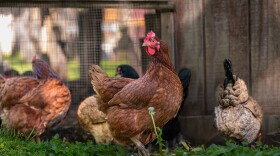Major poultry brands are selling products that frequently contain salmonella, according to a recent report from Farm Forward.
Researchers reviewed inspection data from the U.S. Department of Agriculture, which recently withdrew a proposal that would have given it more authority to enforce safety standards.
Farm Forward’s Executive Director Andrew DeCoriolis didn’t expect things to look good, but he was surprised by the results.
“When I read it, I was like, ‘Oh, this is much scarier than I thought,’” he said.
Salmonella is the leading cause of food illness resulting in death nationwide, responsible for around 1.28 million illnesses and 238 deaths in 2019, according to the U.S. Centers for Disease Control and Prevention. Poultry is responsible for at least a quarter of those infections.
The USDA sorts processors into three categories based on how often they detect salmonella their products. More than 13 percent of facilities are Category 3, meaning their meat exceeds acceptable rates.
The Perdue Foods plant in Washington, Ind., has earned that distinction. It’s the company’s only facility that processes turkey.
Perdue Foods spokesperson Kate Shaw said in an email the company is confident that when handled properly, its meat is perfectly safe. She added that because the USDA rating measures how often salmonella is detected rather than the bacterial load, it doesn't directly correlate with the risk to public health.
“We will continue to invest in rigorous food-safety systems, industry-leading controls, and ongoing third-party verification to protect the families who count on us,” Shaw said.
Read more: Perdue Farms to lay off nearly 300 workers at Washington facility
Even if whole birds are mostly safe, the way they’re processed increases risk. While Perdue's whole birds passed with a Category 1 rating, its ground turkey earned the plant a Category 3 for 55 of the last 60 months.
“Cutting up a whole bird and turning it into smaller parts and combining multiple birds to make ground turkey products, you're increasing the risk of spreading the contamination,” DeCoriolis said.
But although salmonella poses a threat to public health, the USDA is powerless to enforce its own standards.
The department can issue a recall for food contaminated by “adulterants”, a broad category including things from listeria bacteria to pieces of metal. Despite its consequences for human health, salmonella isn’t on that list.




